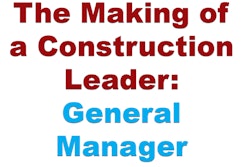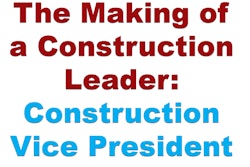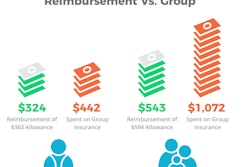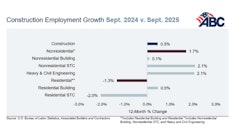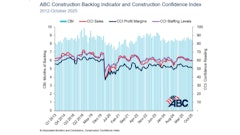
This is the fifth in a series of leadership development articles. In future articles we’ll provide insights to the “making” of a General Superintendent, Vice President, President, Owner, and a Construction Spouse. Articles addressing “The Making of” series for Foremen, Project Manager, Superintendent, and Estimator are available in The Contractor’s Best Friend™ archive, and in Brad Humphrey's book The Making of a Construction Leader.
Of all the “making” series, the position of General Manager might be the newest in its development. As contractors face a future that includes their own retirement or retirement of senior leaders, the general manager role might be one that, if not already in place, could provide a nice alternative or option.
Briefly, for some construction companies, the need to have a single overseer of the operations is critical. If an owner is considering retirement, and there are no relatives to take the reins, or the children are still a few years away from being prepared to lead the organization, then a general manager might be the bridge needed.
Keep in mind that for some construction companies, the title “Division Manager” might be used. For our article here, we’ll consider the “Division” and “General” Manager the same.
For some contractors looking at expansion, either by geography or my market specialty, a general manager might meet this need as well. And finally, for some construction owners and senior leaders, the general manager can provide that one position that truly is the closest to the field and project action, one that is totally focused on running his own, and perhaps limited, field of vision. This allows the owners and other senior leaders to continue to work “on the business” while having a trusted and skilled leader running the daily operations.
Why then a general manager?
Without repeating some of the previous comments, let me list out some reasons why a general manager might be a great option for many contractors.
- Company is simply growing beyond one leader’s capabilities and/or time allowance
- Contractor is expanding into new geographical markets and having an on-site leader, totally dedicated to that market would benefit the company leaders and support the growth
- Construction owner buys out another contractor and wants to set that owner up as a general manager for one to two years, giving the company a chance to learn the new market
- Contractor needs a “buffer” between his (or her) level and that of the other staff
- “Too many relatives” employed and owner realizes that what is needed is an independent and non-family leader to run the show
- Contractor is upgrading systems, computers etc. and needs an expert to oversee such efforts
- Contractor is diversifying the business and wants independent “Profit & Loss” divisions led by a dedicated general manager
- Again, contractor has children still three to five years from leading the company so general manager role becomes a bridge between the now and the future
As you can see, there are a host of reasons why the general manager role might be considered. This list certainly represents many that I’ve seen and have worked with contractors to integrate into their organization.
Now, let’s consider what skills might be needed by a general manager. Remember, some skills might be more slanted to one area or another depending on the reason the position is needed. But for our purposes here, I think we’ll hit many of the needed skills.
The skills of an effective general manager
- Communication skills — First and foremost the general manager must have communication skills to be able to converse with a wide variety of individuals.
- Team skills — It is the general manager that must work at bringing different parties together to have them working effectively.
- Systems skills — The more the general manager understands systems and process management the quicker she will be to truly having a positive impact on the business or some portion of the business.
- Public relations skills — Meeting customers, satisfying architects and engineers, etc., are just a few of the types of people whom the general manager will need to work his magic. Since the general manager fully represents the contractor’s business, it is extremely important that he understand how to “schmooze and mingle” with others.
- Financial skills — The general manager will have to be able to read, understand and produce important financial documents for your business.
- Safety and quality skills — Yes! The general manager needs to be a loud voice for safety and drive every ounce of quality thinking and execution possible. With all of the support today for safety and “lean construction,” these skill areas should be no obstacle to finding a good general manager.
- Decision making/problem solving skills — Certainly there is a difference between making decisions and problem solving, but for our purposes we’ll consider them very close cousins. The general manager role must possess the person who can “pull the trigger” on a daily basis. Prudence, wisdom and effective use of problem solving tools and techniques should be incorporated, but in the end…the general manager must solve problems and make decisions!
- Presentation and facilitation skills — Like communication skills, this skill area lands on several leader’s requirement lists. The general manager will be expected to provide regular updates to their owner or senior leaders so possessing the skills needed to present their information will be necessary.
OK, before you start thinking that the general manager must be some sort of “Superman” let me stop the skill generation. I’ve had contractors over the years tell me that their general manager can just about run the company, without them. Well, to a degree, that’s the idea for most general manager roles. Remember, if you’re an owner or senior leader who must deal with banks, spend more time on business development, etc., then the general manager might come pretty darn close to running the show. However, at the very least, the general manager should be clearly directing traffic on a daily basis.
That, in a nutshell, is why you might need a general manager (or Division Manager) and some of the skills your general manager might need to have.






